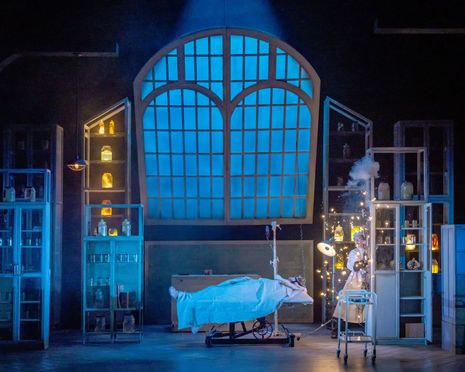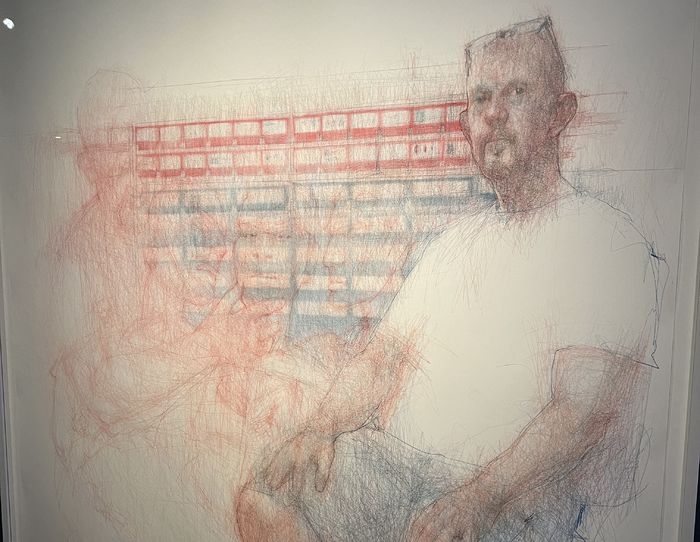Frankenstein: an accessible yet artificial adaptation
Gina Stock finds the Cambridge Arts Theatre’s production of the gothic classic fails to take it beyond its GCSE-text themes.

Sean Aydon’s adaptation of the classic Mary Shelley novel is an engaging, accessible piece of theatre which faithfully - yet unimaginatively - represents its text. While successfully and effectively retelling this compelling story, this exploration of the “modern Prometheus” only scratches the surface of the myriad of philosophical questions posed by the original text, failing to take the time to fully explore the consequences - for both creation and creator - of blurring the lines between right and wrong, nature and science, and life and death.
“The context of imminent war rendered the questions around the morality of scientific discovery even more poignant”
However, an element of this adaptation which brought a fresh significance to the narrative was its 1940s setting. Aside from the vibrant and pleasingly accurate costumes, the context of imminent war rendered the questions around the morality of scientific discovery even more poignant than the original context of the scientific revolution. One only has to cast their mind to the morally dubious biological experiments carried out by Allies and Axis powers during the Second World War for the questions thrown to the Doctor and her assistant about whether experiments should continue to gain a new significance.
Aydon’s choice to alter the protagonist from Victor Frankenstein to Victoria could have shown promise as a choice. However, the effort in costume and physicality towards androgyny, and even masculinity, within Frankenstein’s character ended up coming across as a clumsy suggestion that women can’t be simultaneously intelligent and stereotypically feminine. This was only heightened by the aesthetic contrast between Victoria and her sister Elizabeth, whose femininity was made to feel out of place in the laboratory.
“The development of the play itself felt distinctly artificial”
Equally heavy-handed and overly simplistic was the dialogue; the scenes failed to leave space for nuance or tension, moving from narrative to narrative with obvious verbal signposting. This was most frustrating in the second act, where the audience was left with tonal whiplash after - in a matter of minutes - two characters were pronounced dead just before a pivotal argument developed. Such rushing of the plot did much to undermine the director’s stated intentions of exploring what it means to be human, since the development of the play itself felt distinctly artificial.
The adaptation’s underwhelming simplicity was only further fed by its design elements; Frankenstein’s laboratory was pleasing in colour, yet unimaginatively decorated with stereotypical jars and apparatus. A large looming window emphasised the role of nature and weather in the narrative, while the constant presence of the sky signposted the religious undertones of the creation of life. Despite accurately representing the main themes of the text, the play’s technical elements, in line with its direction, were not ultimately not particularly groundbreaking.
Seeing the audience packed with GCSE students should have been an indication of what this production set out to achieve: an accessible, engaging version of Shelley’s text which is sure to please crowds. Leaving the show, I was left unsatisfied at its shallow exploration of the themes of morality and personhood, left underdeveloped at the expense of dramatism and storytelling.
Frankenstein is playing at the Cambridge Arts Theatre from 3rd-7th October.
 News / CUP announces funding scheme for under-represented academics19 December 2025
News / CUP announces funding scheme for under-represented academics19 December 2025 News / SU reluctantly registers controversial women’s soc18 December 2025
News / SU reluctantly registers controversial women’s soc18 December 2025 News / Cambridge welcomes UK rejoining the Erasmus scheme20 December 2025
News / Cambridge welcomes UK rejoining the Erasmus scheme20 December 2025 Features / Should I stay or should I go? Cambridge students and alumni reflect on how their memories stay with them15 December 2025
Features / Should I stay or should I go? Cambridge students and alumni reflect on how their memories stay with them15 December 2025 Film & TV / Timothée Chalamet and the era-fication of film marketing21 December 2025
Film & TV / Timothée Chalamet and the era-fication of film marketing21 December 2025










